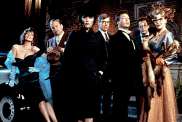Now in theaters!

Cast:
Cameron Diaz as Norma Lewis
James Marsden as Arthur Lewis
Frank Langella as Arlington Steward
James Rebhorn as Norm Cahill
Review:
They say there’s no such thing as easy money and the new sci-fi thriller The Box wants you to take that familiar adage to heart. Written and directed by Richard Kelly, The Box is an adaptation of the 1970 Richard Matheson short story “Button, Button.” This is the story’s second adaptation, the first being for the ’80s revival of The Twilight Zone. While that episode (directed by Peter Medek, best known to genre fans as the director of 1980’s The Changeling) rewrote the conclusion to Matheson’s story, provoking the author’s dissatisfaction, Kelly has had to inject several new elements of his own invention to stretch “Button, Button” to feature length â completely altering the narrative in the process (the original story is still buried in there in the film’s first half â although it ironically retains the TV version’s ending). This may rattle Matheson purists, but clearly Kelly has invested a great deal of his own imagination to make this adaptation as personal a project as his writing/directing debut, the 2001 cult favorite Donnie Darko.
Kelly has stated in interviews that Arthur and Norma Lewis, the middle class Virginia couple that James Marsden and Cameron Diaz play here (both delivering some of the best work of their careers), are meant as a tribute to Kelly’s own parents. As we can tell immediately, these are innately decent people. Arthur, as Kelly’s father had, works for NASA (Arthur helped develop the camera for the Viking space probe) and Norma is a teacher at the local school. They have a young son who’s about twelve and while money could be a lot more flush, their lives seem blessed. If you had to test anyone’s morality, you’d want to test theirs â if this couple can’t be trusted to make the right decisions, then who could?
And that’s the quandary at the heart of The Box. Arthur and Norma really are good people. Under normal circumstances, they’d never hurt anyone. But when the mysterious Arlington Stewart (a smoothly menacing Frank Langella, sporting a CG-enchanced makeup job that recalls Aaron Eckhart’s Two-Face look from The Dark Knight, but much better accomplished) leaves a box on their doorstep and later returns to explain that by simply pressing the button under the glass dome on top of the box, they will become the instant recipients of a million dollars â with the only catch being that someone, somewhere in the world, whom they don’t know, will die at that very instant the button is pressed â it’s not something they can automatically say no to.
To Arthur and Norman’s credit, they don’t press the button before Mr. Stewart has left their house. They have 24 hours to make their decision and they do deliberate the pros and cons of Mr. Stewart’s offer â all while never being sure whether what he told them can possibly be true. But before the 24 hour time limit is up, the button is pressed (this is no spoiler, it happens very early on) and another truism is put into play â that is, “choices have consequences.”
Set in 1976, the necessity of the period time frame is evident early on. There has to be a certain amount of naiveté on the part of the characters for the story to work. First of all, if anyone today found a box wrapped in plain brown paper left on their doorstep, early in the morning by a stranger, they’d be panicked that they just received a bomb and would be unlikely to start unwrapping it at the breakfast table. Also, greed and self-gratification didn’t come so easily to people back in the day. Sure, those qualities existed but they weren’t as rampant as they are now in our compromised era of reality shows and bad behavior.
Most would consider anyone who hesitates to push the button to be chumps but Kelly is aware of this (as was Matheson) and he is using that knowledge of human psychology to tell a moral fable. Kelly doesn’t make his points stridently but yet he doesn’t let anyone off the hook, either. The fact that there are few, if any, viewers watching The Box who wouldn’t make the same choice as Arthur and Norma (it’s easy enough to justify â people die every day, after all, so what’s one more?), and make it much faster, in fact, gives the movie its fascination. We know the choice we would make, and in watching The Box, we get to watch someone else suffer for it. We’re vicariously watching someone pay the price for sharing the same weakness of character that we recognize in ourselves. This isn’t even a heist film or some crime caper where there’s the ‘out’ of being able to say “Oh, of course I’d never become a criminal.” This is a sin literally as easy as pushing a button.
While the moral dilemma is relatable, some may find the film’s trippy sci-fi aspects to be distracting or overwhelming. Bringing in elements of NASA and space exploration just for starters, The Box goes to some very funky places. Too funky, I’m guessing, for most. Although on first pass it seemed to me that even the most bizarre plot elements were sufficiently explained, others will feel â all explanations aside â that The Box is literally overstuffed. That’s a fair reaction but I appreciated the fact that Kelly had the ambition to think big and to make something quirky.
That’s usually an adjective I cringe to hear but I mean it as a positive here. I’m a little astounded, in fact, that Kelly was able to get a studio to put $30 million into such an offbeat project. I also find it funny that this was perceived as being something with commercial appeal when it’s really going to be a movie that only film geeks are going to embrace (you can consider me pleasantly surprised if this turns out to be a hit). As a fan of ’70s paranoid thrillers like The Parallax View (1974), Three Days of the Condor (1975) and Capricorn One (1977), I loved seeing that mood applied to a ’70s-set sci-fi thriller (the period recreation here is wonderful and honestly, I would’ve probably loved The Box just for the surface pleasures of Steven Poster’s cinematography, Priscilla Elliott’s art direction, and Arcade Fire’s Hermann-esque score). This is the kind of movie that could’ve been made in the ’70s, but never was. The 1978 remake of Invasion of the Body Snatchers broached similar territory but this is more about humanity being tested rather than being replaced and thereâs more of a science fiction edge to The Box‘s hocus pocus, as opposed to the pods of Body Snatchers, which function on a more metaphorical level than a speculative science one (although maybe it just superficially appears that way because Kelly indulges his instruction manual fetish).
Spike Jonze’s Where the Wild Things Are earned a lot of attention for being an idiosyncratic adaptation of its source material, evincing the kind of personal vision that isn’t often seen in studio films. But Kelly deserves just as much credit in that regard (ironically, both films are Warner Bros. productions) and I’m sure The Box will prove just as divisive for audiences as Jonze’s film. Either you’re going to watch this with mostly wide-eyed enjoyment or you’ll be impatiently rolling your eyes. It definitely won’t play the same for everyone and what you get out of The Box will likely depend on what you put into it.










